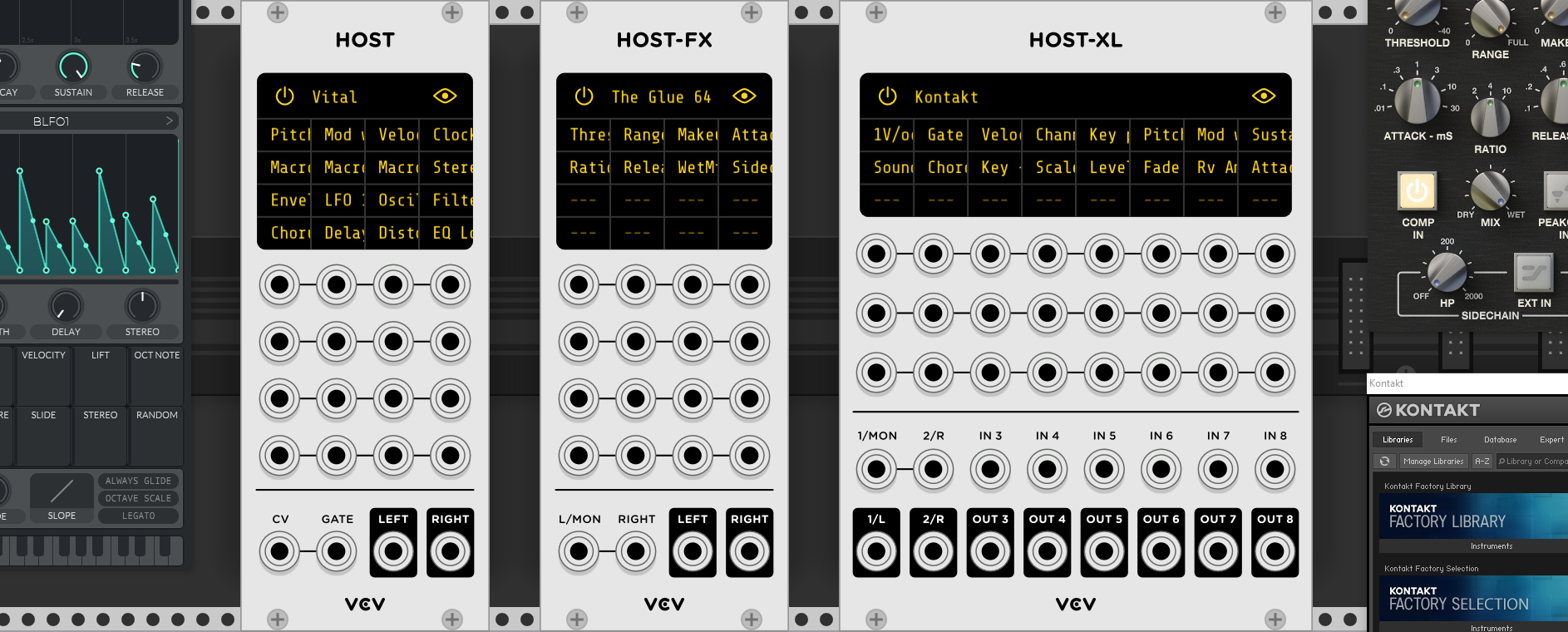
Use 64-bit VST 2 and VST 3 instrument and effect plugins in VCV Rack.
Control VST automation parameters and MIDI with CV.
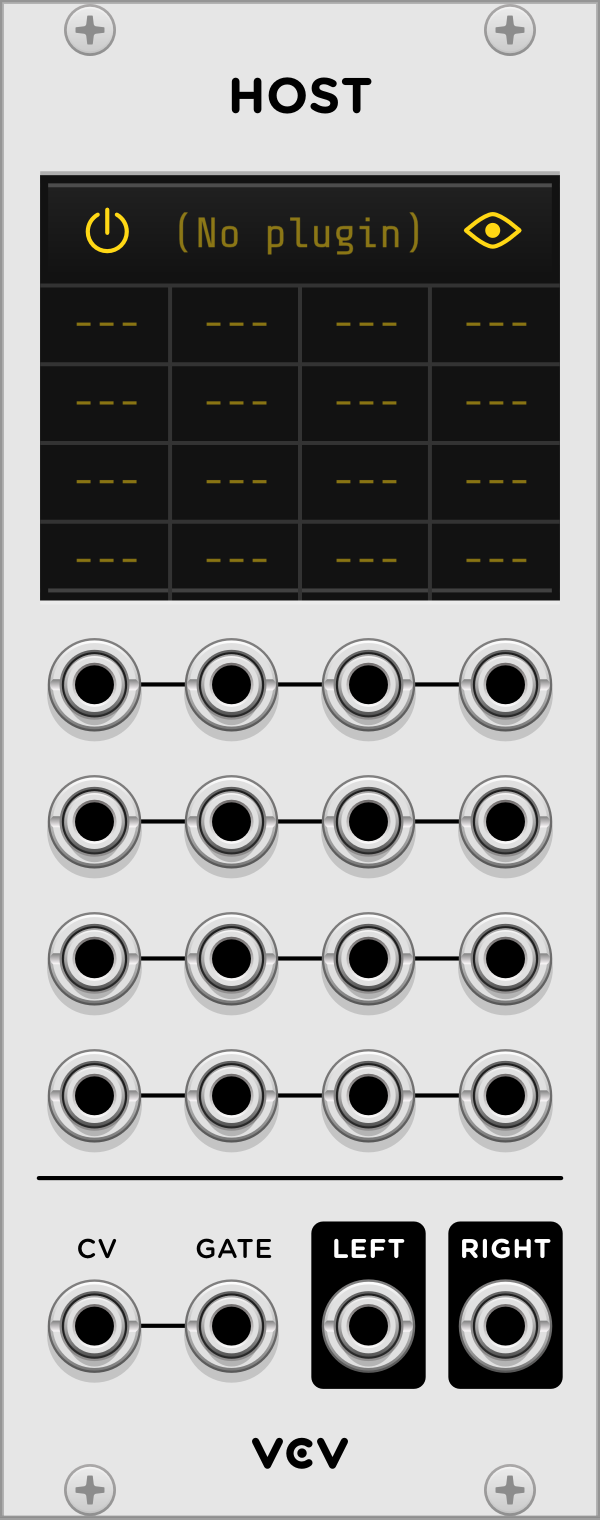
VCV Host (VST instrument host)
For hosting VST instruments, synthesizers, samplers, and sound generators, use Host, which includes 1V/oct pitch CV and gate inputs. When the gate input voltage rises, a MIDI note is triggered according to the current 1V/oct signal, rounded to the nearest note. This note is held until the gate falls to 0V.
Host supports polyphonic cables patched into its CV and gate inputs, as well as key pressure (aftertouch) and velocity parameters.
Selecting and displaying a VST plugin
Click the plugin name label (initially displaying “No plugin”) to open the list of installed VST plugins on your system. When a plugin is loaded, its editor GUI window will be shown. If closed, it can be reopened by clicking the “eye” icon next to the plugin name.
VST parameters
Up to 16 VST automation parameters (24 in Host-XL) can be modulated with CV, with an input range of 0V to 10V.
To map a VST parameter to a parameter input on Host, click a parameter label (initially displaying “- - -”), and the editor window will be shown. Adjust (i.e. wiggle) a knob or slider in the VST editor, and the parameter will be mapped. Alternatively, right-click a parameter label to display a dropdown menu of all available VST parameters.
Host also includes mappable MIDI parameters for generating certain MIDI events, such as note velocity and pitch wheel, available by right-clicking the parameter label.
Note: Many VST plugins are not optimized for fast modulation of its parameters, while modular synthesizers (and thus VCV Rack) are designed to unify the concepts of audio and modulation signals. If you send audio-rate modulation into Host’s parameter inputs, some VST plugins may behave strangely, crash, have bad CPU performance, or produce wonderful results. Use fast modulation at your own risk.
Plugin search directories
In the plugin dropdown menu (opened by clicking the plugin name label), you can add or remove directories to allow VCV Host to search for plugins in different VST installation locations. Searching is recursive, and plugins are searched immediately. There is no need to restart Rack if a new directory is added or a new plugin is installed.
Block size
While Rack modules process each sample one-by-one, VST plugins must process blocks of samples in bulk. Because of this, VCV Host waits until the block is filled before requesting the VST plugin to process audio. Lower block sizes result in lower latency but force the plugin to process more often, which consumes more CPU.
If you wish to change the block size, right-click on the panel of Host. The default size is 128 samples (2.9ms @ 44.1kHz), which is a reasonable balance of CPU and latency. The minimum block size is 16 (0.4ms), which consumes lots of CPU but has very small latency, and the maximum is 4096 (93ms), which is light on CPU but has very noticeable latency.
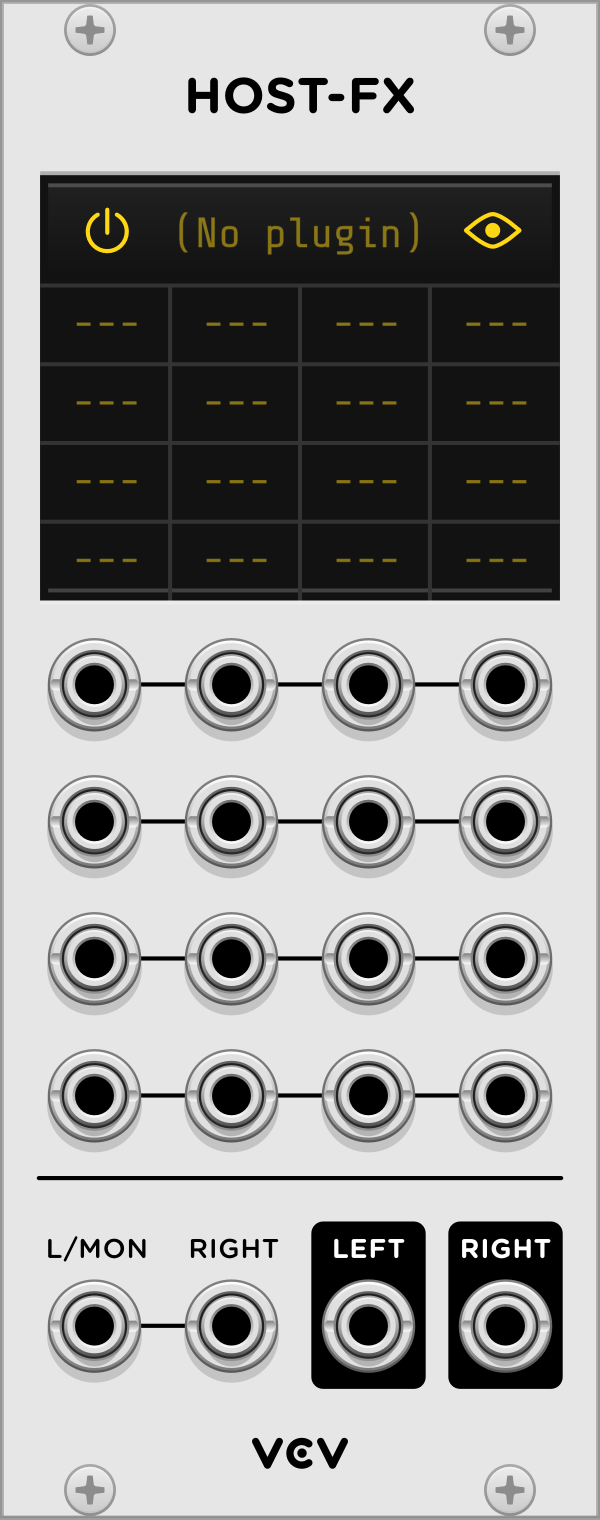
VCV Host-FX (VST effect host)
For hosting VST effects, processors, and pedals, use Host-FX, which includes stereo audio inputs. The right input is normalized to the left input, so mono audio can be mapped to both stereo channels.
For common functionality, see Host.
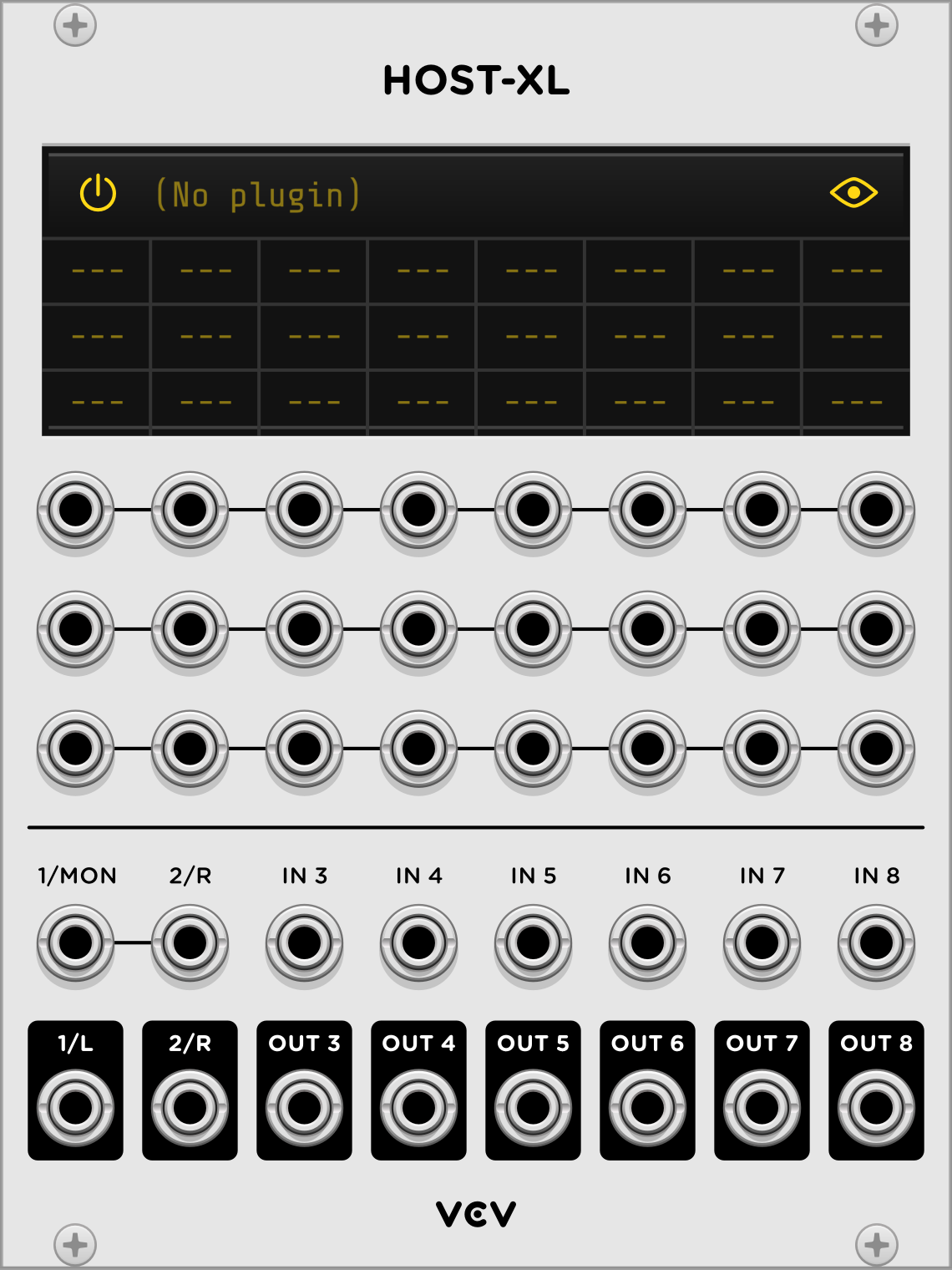
VCV Host-XL (Expanded VST instrument/effect host)
If more than 2 channels of audio are needed, use Host-XL, which includes 8 audio inputs, 8 audio outputs, and 24 parameter inputs.
Although Host-XL does not include labeled CV and gate inputs, you can send CV and gate signals to instrument plugins using MIDI parameters (see below section).
For common functionality, see Host.

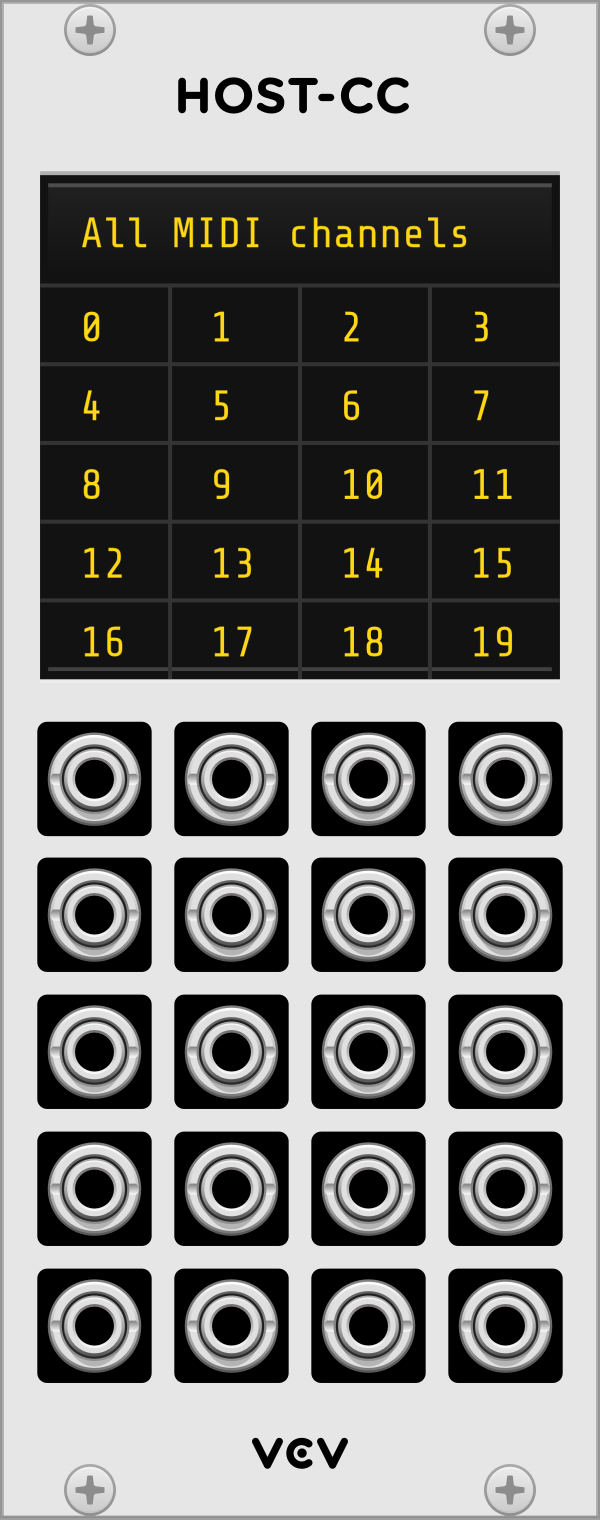

VCV Host-CV, Host-CC, and Host-Gate (MIDI output expanders)
If a VST plugin in a Host, Host-FX, or Host-XL module generates MIDI output (such as a sequencer or audio-to-pitch detector), you can place one of these expanders on its right to convert the VST plugin’s MIDI output to CV and gates in Rack.
These modules function identically to VCV MIDI to CV, MIDI CC to CV, and MIDI to Gate except instead of selecting a hardware MIDI input, it “steals” MIDI generated by the Host module touching its left side. If your VST plugin generates multiple channels of MIDI output, you can filter by MIDI channel by clicking an expander’s LED display. Host MIDI expanders can be daisy-chained, sending MIDI from their left to their right.
VST support
Hundreds of 64-bit VST 2/3 plugins have been tested with VCV Host. However, if you experience bugs or crashes with your VST plugins, please email support@vcvrack.com with the following information: your Rack version, operating system/version, VST plugin/version, and a description or screenshot of the faulty behavior.
VST is a trademark of Steinberg Media Technologies GmbH.
VCV Host Changelog
2.0.2 (2021-12-06)
- Fix loading VST3 sub-plugins such as Reason Rack Plugin.
2.0.1 (2021-12-02)
- Fix crash when exiting Rack while Host is running.
2.0.0 (2021-11-30)
- Update to Rack 2
1.3.1 (2021-08-01)
- Fix graphics rendering issue with New Sonic Arts Granite VST2 plugin.
1.3.0 (2021-04-21)
- Add MIDI output expanders: Host-CV, Host-CC, and Host-Gate. If using a VST plugin that generates MIDI output in Host, Host-FX, or Host-XL, place an expander to its right. Expanders can be chained.
1.2.2 (2021-01-31)
- Fix crash when loading some Voxengo VST2 plugins.
- Use “plug” window icon in VST editor windows.
1.2.1 (2020-10-02)
- Fix loading MikeMorenoDSP LIRA-8 VST3 plugin.
- Fix probable crash with Reason Rack Plugin VST3 plugin when adjusting parameter while another parameter is being modulated.
- Fix loading certain Yamaha VST3 plugins such as MOTIF Editor and MONTAGE editor.
1.2.0 (2020-09-25)
- Add ability to load VST3 plugins.
- Fix MIDI Gate not working when set as the first parameter.
- Add MIDI panic to context menu.
1.1.0 (2019-12-17)
- Add MIDI note gates/triggers to parameters. Useful for drum machine VST instruments.
- Add factory presets for common drum pad layouts.
- Display VST plugins in a folder hierarchy instead of a flat list in the plugin menu.
- Allow VST worker thread to be disabled, allowing VST processing directly on Rack’s engine thread.
1.0.4 (2019-08-30)
- Add “VST shell” support for plugins from Waves Audio and Expert Sleepers Silent Way.
- Fix slight tempo jitter when using a clock input.
- Improve serialization performance, which fixes plugins with large states (like Arturia SparkLE) causing audio glitches when Rack autosaves.
1.0.3 (2019-07-19)
- Fix crash when loading UAD plugins.
1.0.2 (2019-06-23)
- Limit plugin searching to 2 subdirectories.
- Sum polyphonic audio inputs.
1.0.1 (2019-06-20)
- Fix bug that makes plugin searching slow.
1.0.0 (2019-06-18)
- Add polyphonic support for 1V/oct CV, gate, velocity, and key pressure.
- Pass key presses through to Rack so the Computer Keyboard MIDI driver can be used while VST editor windows are focused. (Only works on some VST plugins on some operating systems.)
0.6.4 (2019-03-31)
- Add Host-XL.
- Allow both effect and instrument VST plugins to be loaded in all Host modules.
- Chang audio voltage range from [-5V, 5V] to [-10V, 10V].
- Add MIDI CV and gate to parameter list for Host modules without CV/gate inputs.
0.6.3 (2019-02-25)
- Fall back to storing parameter values when the plugin doesn’t support effGetChunk.
- Save and restore the VST program number.
- Loading and unloading VST plugins no longer blocks the Rack engine, avoiding pops and stutters.
0.6.2 (2018-12-05)
- Add transport controls.
- Add clock tempo sync.
- Add sustain pedal MIDI parameter.
- Chang default MIDI velocity from 127 to 100.
0.6.1 (2018-11-25)
- Add search field to plugins list.
- Add title to VST editor window.
- Fix bug where VST instruments received notes with >127 velocity by default.
- Fix bug when minimizing a VST editor window.
0.6.0 (2018-11-24)
- Initial release.